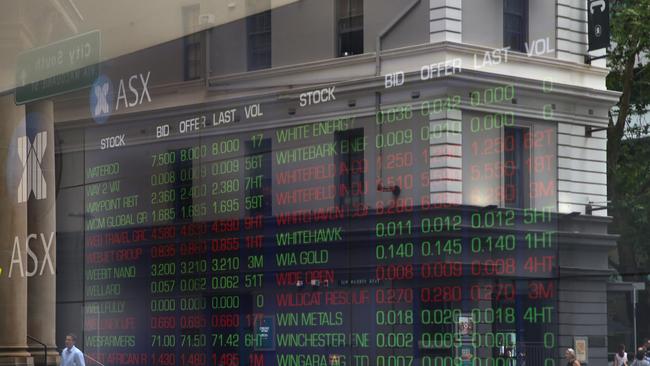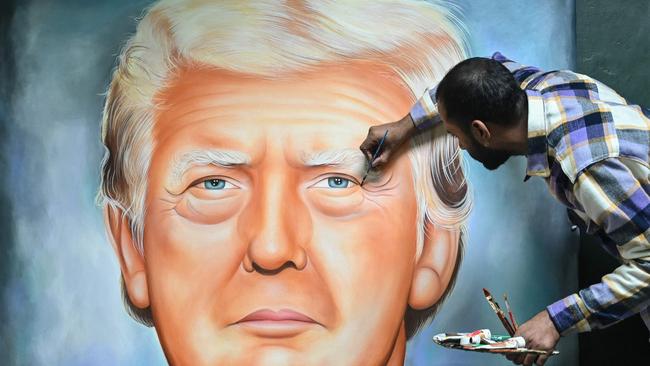ASX to rise as markets brace for Trump volatility ahead
The sharemarket is expected to rise on Monday but the rest of the week could be volatile as markets wait to see incoming president Donald Trump’s executive orders.

The Australian sharemarket is tipped for a positive start to the week following solid overseas leads, with miners and technology stocks set to drive the bourse higher ahead of US president-elect Donald Trump’s inauguration.
SPI futures are pointing to a 0.3 per cent rise at Monday’s open, reversing Friday’s losses on the local bourse as investors look to recent gains recorded in the US and Europe.
CommSec chief economist Ryan Felsman said technology stocks and miners should drive Monday’s gains on the ASX.
“The tech sector could be a strong performer after tech stocks in the US performed particularly well on Friday,” he told The Australian. “We saw chipmakers like Nvidia up 3.1 per cent, Broadcom up 3.5 per cent and Intel up 9.3 per cent on takeover speculation. So it could be a good session for the tech sector.
“Alongside that, the iron ore price continues to creep up – it’s now near four-week highs. We’ve also just seen a raft of better-than-expected economic data out of China, particularly economic growth data. So we could see a continuation of that bounce with the miners,” he added.
The iron ore price rose 0.7 per cent to $US101.21 a tonne on Friday. While technology and miners should support the local market, the energy sector could drag after oil prices fell 1 per cent on Friday.

In the US, all three major indices on Wall Street closed Friday’s session higher, with the Nasdaq Composite propelled by the rise in technology stocks.
The Dow Jones Industrial Average finished up 0.8 per cent at 43,487.83, the S&P 500 rose 1 per cent to 5996.66 and the Nasdaq Composite Index jumped 1.5 per cent to 19,630.20.
In Europe, London’s benchmark FTSE 100 and Frankfurt’s DAX 40 index hit new all-time highs.
The rally had been very broadly based, Steve Sosnick from Interactive Brokers said of the Wall Street rally.
He said there seemed to be “a bit of enthusiasm” that Mr Trump’s likely economic policies would be good for the financial markets.
Mr Trump is due to be sworn in as US president on Monday, Australian time.
Chinese markets also closed higher on Friday after fresh data showed the country’s economy grew slightly faster than expected last year. The 5 per cent expansion was in line with the government’s target but the weakest since 1990 – excluding the pandemic years – as leaders fought to address weak consumption and a real estate debt crisis.
A surge in the final quarter was helped by a string of stimulus measures and a boost in retail sales.
AMP chief economist Shane Oliver warned it could be a rocky ride for investors this week, depending on what Mr Trump announces in his first days as president.
The Republican president-elect won November’s election on a pledge to boost the US economy by cutting red tape and taxes, and boosting US domestic energy production.
But his pledges to hike tariffs on goods entering the US and deport millions of undocumented workers have also raised concern about the possible impact on growth and inflation.
“I suspect there’ll be a flurry of announcements regarding immigration, particularly close closing the southern border,” Dr Oliver said.
“Then, in relation to federal workers, there’ll likely be a hiring freeze or something like that.
“I think there will be announcements on tariffs but it’s just a bit unclear as to how definitive they will be, and whether they will kick in immediately… so it could be a somewhat volatile ride on markets depending on what he says,” Dr Oliver warned.
One big uncertainty was what the incoming president’s announcements would mean for bond yields and the US dollar and, by implication, the Aussie dollar, he added. “I suspect we’ll have another volatile week on the Aussie dollar, largely dependent on what Trump announces,” he said.
The local currency, which was trading around US61.93c over the weekend, has fallen about 10 per cent against the US dollar since September.
Additional reporting: AFP





To join the conversation, please log in. Don't have an account? Register
Join the conversation, you are commenting as Logout